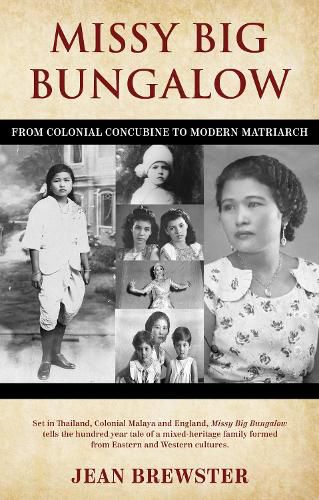Readings Newsletter
Become a Readings Member to make your shopping experience even easier.
Sign in or sign up for free!
You’re not far away from qualifying for FREE standard shipping within Australia
You’ve qualified for FREE standard shipping within Australia
The cart is loading…






This title is printed to order. This book may have been self-published. If so, we cannot guarantee the quality of the content. In the main most books will have gone through the editing process however some may not. We therefore suggest that you be aware of this before ordering this book. If in doubt check either the author or publisher’s details as we are unable to accept any returns unless they are faulty. Please contact us if you have any questions.
Missy Big Bungalow examines the effect of European men arriving in Siam and Malaya from 1900, but this is told - unusually - from an Asian woman's point of view. That woman is the author's grandmother, Chalerm, poor but beautiful and resourceful. To escape poverty, from the age of 15 she is the paramour over twenty years of a Dane, then a Scot. Marriage is impossible. She lives fairy-tale lives, hence her nickname, Missy Big Bungalow. However, her comfortable life is later punctuated by dark episodes, especially after the Japanese occupy Malaya in 1942. This time of turmoil and terror forces Chalerm to make a brave, heart-breaking decision to save her family by moving in as a Japanese businessman's concubine. By war's end, although a survivor, she's bitter and disillusioned.
In 1948 British and Allied Forces fight another war in Malaya, this time against Chinese communists. Chalerm's half-Scottish daughter marries an English soldier and moves to Nottingham. Chalerm then receives baffling accounts of her daughter's life in austerity Britain. These provide her with startlingly unexpected views of the British. Later, changing social mores mean Chalerm actually marries a Scot.
This mixed-heritage family experiences a rich yet sometimes contradictory life in a British colony. The author's task has been to try to investigate the varied impact of the British Empire on the local Asian people using her grandmother's family as a microcosm.
$9.00 standard shipping within Australia
FREE standard shipping within Australia for orders over $100.00
Express & International shipping calculated at checkout
This title is printed to order. This book may have been self-published. If so, we cannot guarantee the quality of the content. In the main most books will have gone through the editing process however some may not. We therefore suggest that you be aware of this before ordering this book. If in doubt check either the author or publisher’s details as we are unable to accept any returns unless they are faulty. Please contact us if you have any questions.
Missy Big Bungalow examines the effect of European men arriving in Siam and Malaya from 1900, but this is told - unusually - from an Asian woman's point of view. That woman is the author's grandmother, Chalerm, poor but beautiful and resourceful. To escape poverty, from the age of 15 she is the paramour over twenty years of a Dane, then a Scot. Marriage is impossible. She lives fairy-tale lives, hence her nickname, Missy Big Bungalow. However, her comfortable life is later punctuated by dark episodes, especially after the Japanese occupy Malaya in 1942. This time of turmoil and terror forces Chalerm to make a brave, heart-breaking decision to save her family by moving in as a Japanese businessman's concubine. By war's end, although a survivor, she's bitter and disillusioned.
In 1948 British and Allied Forces fight another war in Malaya, this time against Chinese communists. Chalerm's half-Scottish daughter marries an English soldier and moves to Nottingham. Chalerm then receives baffling accounts of her daughter's life in austerity Britain. These provide her with startlingly unexpected views of the British. Later, changing social mores mean Chalerm actually marries a Scot.
This mixed-heritage family experiences a rich yet sometimes contradictory life in a British colony. The author's task has been to try to investigate the varied impact of the British Empire on the local Asian people using her grandmother's family as a microcosm.